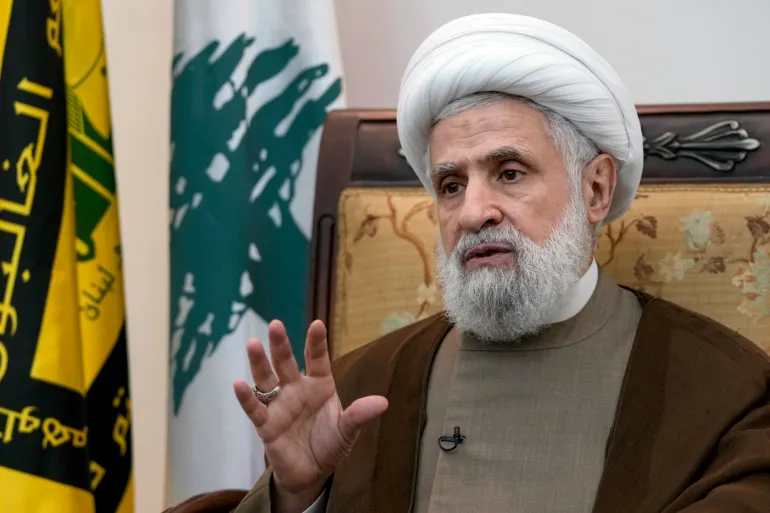Hezbollah, the Lebanese political and militant organisation, recently announced that Naim Qassem has stepped up as its new secretary-general following the assassination of its previous leader, Hassan Nasrallah. Qassem, a longstanding figure in Hezbollah, brings a history of political and religious involvement to his new position. With Hezbollah facing both internal and external pressures, Qassem’s appointment marks a critical moment for the organisation as it navigates a complex regional landscape.
Qassem’s Background and Early Activism
Born in Kfar Kila, a village in southern Lebanon, Qassem grew up amidst ongoing tensions between Lebanon and Israel. His upbringing in a conflict-ridden area deeply influenced his political and religious journey. In the 1970s, Qassem joined the Movement of the Dispossessed, an organisation founded by Imam Musa al-Sadr to advocate for Shia rights and social justice.
This movement later became part of the Amal Movement, a significant Shia political force in Lebanon. Qassem’s dedication to his community’s cause led him to a career in religious education, where he taught classes in Beirut for decades. Over the years, he aligned with Hezbollah, moving up its ranks and eventually becoming the deputy secretary-general in 1991.
Longtime Leadership Role in Hezbollah
Qassem’s longstanding role within Hezbollah has provided him with extensive experience and deep ties within the organization. Since 1991, he has held the position of deputy secretary-general, serving under the leadership of both Abbas al-Musawi and Hassan Nasrallah. This position allowed him to influence Hezbollah’s direction while building relationships with key members.
His responsibilities included managing Hezbollah’s educational network and overseeing parliamentary activities. Qassem also became known to the public through various interviews and statements, representing Hezbollah’s position on regional issues. He has been a member of Hezbollah’s Shura Council, the organization’s governing body, which gave him significant input into major decisions.
A Leader Amid Crisis
The transition in Hezbollah’s leadership comes at a turbulent time. Israel’s recent attacks have severely impacted Hezbollah’s leadership, with multiple high-ranking members assassinated in recent weeks. The group faces intense military and political challenges, including strained relationships with domestic political allies. Nasrallah’s assassination left a leadership void, and Hezbollah’s Shura Council decided to appoint Qassem amid ongoing conflict. The urgency of the decision reflects the need for stable leadership as Hezbollah adapts to the shifting dynamics in Lebanon and the broader Middle East.
Qassem’s appointment signals continuity rather than a shift in Hezbollah’s strategy. His deep-rooted involvement in the organization’s activities suggests that he will likely maintain the policies and approaches established under Nasrallah. However, Qassem’s leadership style and decisions in the coming months may offer insights into any subtle shifts within Hezbollah as it responds to mounting challenges.
Religious and Political Influence
Qassem’s background in religious studies and close association with respected Shia scholars has significantly shaped his role within Hezbollah. One of his mentors, Grand Ayatollah Mohammad Hussein Fadlallah, was a prominent Shia cleric whose teachings emphasized social justice and resistance against foreign occupation. Qassem has written on Hezbollah’s history, publishing a book titled Hizbullah, the Story from Within which has been translated into multiple languages. His religious expertise and close connections with influential scholars have earned him respect within Shia communities in Lebanon and beyond.
Qassem’s religious background also sets him apart visually. Unlike Nasrallah and other leaders, who wore black turbans signifying descent from the Prophet Muhammad, Qassem’s white turban indicates a different lineage. This difference, while symbolic, reflects the diversity within Shia Islam and Hezbollah’s ranks.
Challenges and Expectations for Hezbollah’s New Leader
As Hezbollah’s new secretary-general, Qassem faces several significant challenges. Internally, Hezbollah’s political allies in Lebanon are beginning to distance themselves amid escalating tensions with Israel. Externally, the group is under pressure from international actors who view its growing influence in Lebanon and the region as a threat. Qassem will need to navigate these complexities carefully to maintain Hezbollah’s political and military position.
The recent wave of assassinations targeting Hezbollah leaders also poses a challenge. With much of the organization’s original leadership gone, Qassem’s appointment represents one of the last links to Hezbollah’s founding generation. His ability to inspire loyalty and adapt to Hezbollah’s evolving circumstances will be crucial as the organization rebuilds its leadership structure and responds to external threats.
What Qassem’s Leadership Means for Hezbollah’s Future
Qassem’s appointment may bring a period of stability to Hezbollah, as his leadership style aligns closely with that of his predecessors. His extensive experience, commitment to Hezbollah’s cause, and deep roots within Shia communities make him a steady choice to guide the organisation. His leadership will be tested as Hezbollah faces growing political isolation within Lebanon and heightened scrutiny from the international community. Qassem’s next moves will be closely watched as he steers Hezbollah through one of its most challenging eras.
For now, Qassem’s leadership appears to represent continuity for Hezbollah, maintaining the policies and strategies developed over decades. As he steps into his new role, Qassem’s actions will help define Hezbollah’s approach to both old and new challenges in the region.

